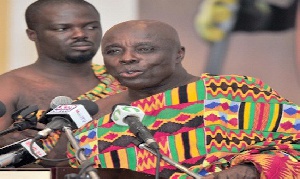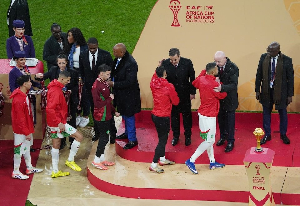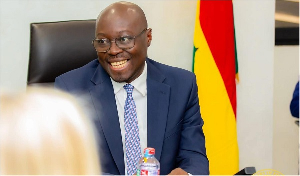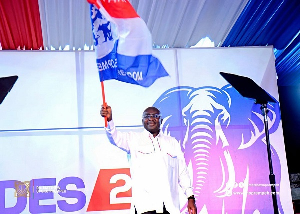We can have intellectual argument or debate all day about the relevance of the institution of chieftaincy in contemporary Ghana; however, what no Ghanaian can vehemently dispute is the popularity of traditional chiefs and their decades-old roles in this country’s culture.
Although one will admit that not all the countless traditional rulers in Ghana share the same level of fame or popularity, still a large number of them are a force to reckon with regarding the sociopolitical and cultural trajectories of this nation.
Among some of these popular or powerful traditional rulers in Ghana go by their respective titles such as “Asantehene, Manponghene, Ga Mantse, Ya-Na, Okyenhene, Togbe, and few others. In fact, any person who bears one of the foregoing traditional titles is already prominent in this country such that the bearer doesn’t need further introduction to be adjudged popular by Ghanaians.
The current Okyenhene, Osagyefo Amoatia Ofori-Panyin, II, for example, is not only famous as paramount chief of Akyem-Abuakwa traditional area but also the mere fact that he carries the title of “Okyenhene” makes him popular in Ghanaian society. So, when one Mr. Stan Dogbe, described in the media circles as ex-presidential staffer during the Mahama-led NDC government, ignorantly told the whole world that the Okyenhene should “Stop seeking cheap popularity with your colored stories,” one begins to question the guy’s thought process. Clearly, some of us need to question Mr. Dogbe’s way of thinking here; especially, given the disheartening circumstances which precipitated the Okyenhene to tell the so-called “colored stories” about the unexpected death of his friend, the former Vice-President Kwesi Bekoe Amissah-Arthur.
The disturbing thing of it all is that here is an individual (Mr. Dogbe) who used to serve/help the former president of the republic ruled Ghana, and yet betrayed himself glaringly as someone incapable of distinguishing between a prominent ruler giving detailed descriptions of a sad incident as it unfolded on one hand and misconstruing to tell “colored stories to gain popularity” on the other.
Let Mr. Stan Dogbe and those who reason like him—if they so wish—pay visit to all the paramount chiefs in Ghana, including the Asantehene, and inquire about the status of Okyenhene and they will quickly find out the extent and the depth of Osagyefo Amoatia Ofori-Panyin’s true popularity. Among many of the learning curves, Mr. Dogbe will definitely understand that the traditional ruler of Okyenhene caliber does not need to narrate “colored stories” of untimely death of an ex-veep of Ghana to attain “cheap popularity.”
It is worth knowing that human events tend to intertwine and impact each other every day on so many levels that in most cases we consciously or unintentionally fail to understand the context or draw connection(s) between two or more separate events as they unfold.
This is because a particular behavior or event may happen months ago or hundreds of miles apart and so the combination of distance and humans’ tendency to forget quickly of previous occurrences, often lead us to focus intensely on what we are only witnessing or unfolding before us. But, things do not just happened in a vacuum. What is the point here? Let’s connect some dots.
Soon after the main opposition group, the NPP, led by Nana Akufo-Addo had soundly defeated then Mahama-led NDC government in the general elections in 2016, the top echelons of the vanquished group (NDC) tasked the former finance minister Dr. Kwesi Botchwey and few others to search for possible answers underlying the party’s humiliating electoral defeat.
According to many reliable sources, among some of Dr. Botchwey’s findings is that the NDC as a political party does not have considerable number of core members with “intellectual firepower.”
The foregoing assessment can also mean the NDC current party leadership is anemic in terms of policy wonks, including members with analytic/critical thinking skills. Most likely, this is why people like Stan Dogbe, Kofi Adams, Koku Anyidoho, Asiedu Nketiah, Valerie Sawyer, and others have mostly specialized in unguarded pronouncements devoid of any mastery of serious and in-depth policy analysis. So when the likes of Mr. Anyidoho fumes about how President Akufo-Addo should be careful because “history has a way of repeating itself” similar to Nana Addo’s late father “situation” in the early 1970s; Kofi Adams, Asiedu Nketia and co., call for nationwide strike, including their determined effort to make Ghana “ungovernable,” because their favorite Electoral Commissioner Charlotte Osei is fired from her job for engaging in serious breaches of the law; and Valerie Sawyer’s simplistic view that the EC’s dismissal “smells of koobi” all speak volumes about the intellectual deficit Dr. Botchwey objectively identified within his party.
Indeed, the connection is clear. Critical thinking and empty utterances are mutually exclusive. For how can Mr. Stan Dogbe in one breath claims the Okyenhene, Osagyefo Amoatia Ofori Panyin, II, is craving for “cheap popularity” by exaggerating the manner within which the ex-vice president died, and in the same breath asserts that President Akufo-Addo is the “son” of the Okyenhene?
If this is the case, why then does Okyenhene have to “colored his stories” to be popular”? After all, the most popular human being in Ghana today is the president of the republic; and from Mr. Dogbe’s cynical admission, the Okyenhene is the “ancestral father” of the president.
How more popular can the Okyenhene be than being the “father” of the most popular citizen in the country now? You bet, in every human endeavor critical thinking really matters!
Bernard Asubonteng is a social critic.
Opinions of Friday, 6 July 2018
Columnist: Bernard Asubonteng
Does Okyenhene need to tell 'colored story' to be popular?
Entertainment














